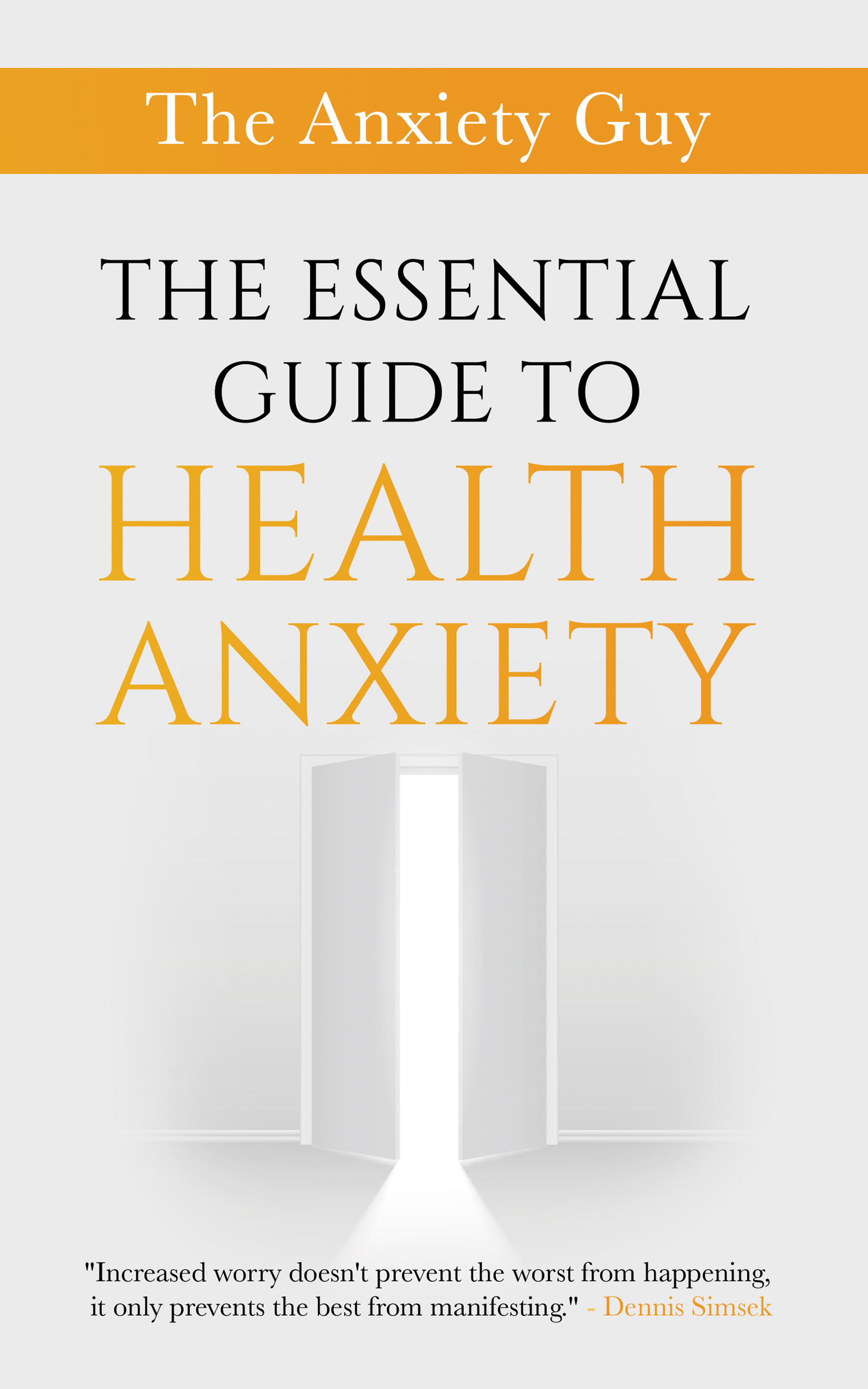In today’s episode of Anxiety Guy, I’m excited to share a straightforward change in perspective that can transform your anxiety. It’s frequently the correct mindset that fosters significant healing from anxiety and the actionable steps necessary for addressing anxiety as it arises. Hope you enjoy it!
In the fast-paced world we live in, anxiety has become increasingly prevalent, and its grip on our minds can be paralyzing. Negative thinking, in particular, is a common symptom of anxiety that can hinder our ability to live a fulfilling life. But breaking free from this cycle is possible, and it starts with understanding the root causes of our negative thoughts.
Join us in today’s anxiety guy podcast as we embark on a transformative journey towards liberation from anxiety’s grasp.
Discover how to challenge negative thoughts, develop healthier thinking patterns, and cultivate a positive mindset that nurtures our well-being. It’s time to break free from the shackles of anxiety and embrace a life filled with optimism and self-empowerment. Are you ready to embark on this liberating journey? Let’s begin.
Understanding anxiety and its impact on negative thinking
Anxiety is a natural response to stress or danger, but when it becomes chronic and overwhelming, it can lead to negative thinking patterns. When we are anxious, our minds tend to focus on worst-case scenarios and dwell on negative outcomes. This constant rumination fuels a cycle of negative thoughts that further intensify our anxiety.
Negative thinking can manifest in various ways, such as catastrophizing, overgeneralization, and self-criticism. Catastrophizing involves blowing small problems out of proportion and imagining the worst possible outcome. Overgeneralization occurs when we take a single negative experience and apply it to all future situations. Self-criticism involves being overly harsh and self-deprecating, often leading to feelings of worthlessness and low self-esteem.
To break free from anxiety’s grip on negative thinking, it is crucial to recognize these patterns and understand that they are distortions of reality. Our thoughts are not always accurate reflections of the truth, and by challenging them, we can begin to reframe our mindset.
The power of reframing negative thoughts
Reframing negative thoughts involves consciously challenging and replacing them with more positive and realistic alternatives. This technique is a cornerstone of cognitive-behavioral therapy (CBT), a widely recognized and effective treatment for anxiety disorders.
To transform your anxiety, we must first identify these connecting ideas and examine them. This requires self-awareness and mindfulness of our thinking patterns. Once we catch ourselves engaging in negative thinking, we can question the evidence supporting these thoughts and consider alternative explanations.
For example, if we catch ourselves catastrophizing about a work presentation, we can ask ourselves whether there is any concrete evidence to support our catastrophic thoughts. More often than not, we will find that our fears are unfounded and based on irrational beliefs. By challenging these thoughts, we can replace them with more balanced and realistic ones, such as acknowledging our abilities and past successes.
Reframing takes practice and perseverance, but over time, it can lead to a profound shift in our thinking patterns. By consciously choosing to focus on positive and realistic thoughts, we can gradually rewire our brains and reduce the grip of anxiety on our minds.
Cognitive-behavioral techniques for challenging negative thinking
In addition to reframing negative thoughts, cognitive-behavioral therapy offers various techniques to challenge negative thinking and overcome anxiety. These techniques aim to disrupt the cycle of negative thoughts and replace them with healthier alternatives.
One such technique is called “thought stopping.” It involves interrupting negative thoughts by mentally saying “stop” or using a physical gesture like snapping a rubber band on the wrist. By interrupting the negative thought process, we create space for more positive and constructive thinking.
Another way to transform your anxiety is “thought substitution.”
This involves consciously replacing negative thoughts with positive or neutral ones. For example, if we catch ourselves thinking, “I’m going to fail,” we can substitute it with a more empowering thought like, “I am capable of handling any challenges that come my way.” By consistently substituting negative thoughts with positive ones, we can rewire our brains and develop a more optimistic mindset.
Cognitive-behavioral therapy for anxiety techniques also involve challenging cognitive distortions, which are irrational thoughts that contribute to negative thinking. These distortions include all-or-nothing thinking, personalization, and emotional reasoning. By identifying and challenging these distortions, we can gain a more balanced perspective and reduce the impact of negative thinking on our lives.
Surrender Sessions for anxiety and negative thinking
Surrender session practices have gained significant popularity in recent years due to their effectiveness in reducing anxiety and promoting overall well-being. These practices involve cultivating present-moment awareness and non-judgmental acceptance of our thoughts and emotions.
When it comes to anxiety and negative thinking, mindfulness can be a powerful tool for breaking free from their grip. By bringing our attention to the present moment, we can detach ourselves from anxious thoughts and observe them without getting caught up in their narratives.
Meditation, a form of mindfulness practice, involves intentionally focusing our attention on a specific object or sensation, such as the breath. Through regular meditation practice, we can develop the ability to observe our thoughts and emotions without being consumed by them. This cultivates a sense of inner calm and empowers us to let go of negative thinking patterns.
By incorporating mindfulness and meditation into our daily lives, we can create a mental space that allows us to respond to anxiety and negative thoughts with greater clarity and equanimity. These practices help us cultivate a deep sense of self-awareness and promote a positive mindset that nurtures our well-being.
Overcoming Perfectionism and Setting Realistic Expectations
Negative thinking often stems from a tendency towards perfectionism and setting unrealistic expectations for ourselves. We strive for flawlessness in every aspect of our lives, and when we fall short, we beat ourselves up with self-critical thoughts. This constant striving for perfection creates a breeding ground for anxiety and negative thinking.
To transform your anxiety, it’s important to recognize that perfection is an unattainable goal. We need to shift our mindset and embrace the concept of progress over perfection. Instead of focusing on the end result, we should celebrate our efforts and the journey we take to achieve our goals. This shift in perspective allows us to set realistic expectations and be kinder to ourselves.
Another effective strategy to transform your anxiety is by examining the evidence behind these ideas.
Often, our negative thoughts are based on distorted thinking patterns, such as catastrophizing or overgeneralizing. By objectively evaluating the evidence, we can counter these negative thoughts with more rational and balanced perspectives. This practice of cognitive restructuring helps to weaken the grip of anxiety on our thinking process.
Additionally, surrounding ourselves with a supportive network of friends and family can provide valuable perspective and encouragement. Sharing our struggles with others not only helps us feel understood but also allows us to gain insights into different ways of thinking and coping. Remember, we are not alone in our journey towards overcoming anxiety thinking.
Ready to transform your anxiety? Comment below on your ‘more than anxiety moment’ from the episode.
The Anxiety Guy Podcast is one of the most popular mental health podcasts in the world with more than 6 million downloads alongside the Health Anxiety Podcast Show.
It has been selected as the top mental health and anxiety podcast on Apple 6 times, and has been listen as a top podcast for anxiety today on Psychology Today, Choosing Therapy, Better Help, Women’s Health, Marissa Peer and many more. To listen to any of the past episodes for free, check out this page.
Listen to all future anxiety guy podcast episodes on Spotify, Tune-in, Podbean, Podbay, Podcast Addict, Scribd, Luminary, Google Podcasts, Amazon Music, or on your favorite podcast platform. You can watch all previous anxiety guy episodes through video on YouTube here.




















Dear Dennis,
I hope you’re well. I’ve recently found your podcast, and I just wanted to say how much it has helped me, especially the latest episode about conscious and unconscious stress and responding to threat responses. I was diagnosed with Pure OCD in 2010, and some days are a bit of a battle.
I apologise if you’re not the person to be asking, but I also have a podcast called “Dad Mind Matters” that I set up in 2022 to hopefully support other Dads who struggle with their mental health.
I’ve written two books, “First Time Dad” and “One Dad & His Dog,” largely about mental health.
If you ever wanted a guest on your show, it would be great to talk to you, and I’m confident I could provide value for your listeners.
Anyway, I hope all is good with you, and thanks again for your great content.
Kind Regards
James
Appreciate it, and please take care.